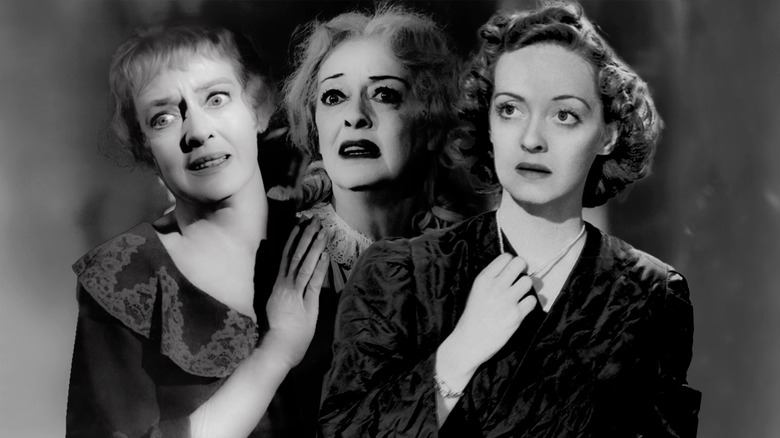
Many have tried to define Bette Davis, but few have succeeded. Nobody stormed into Hollywood and changed it forever as she did. She took great delight in playing tough, complicated women, the kind of women who loved men, like most female characters in early Hollywood. And although these were women who loved men, they didn't need them to survive. Davis was exceptionally confident and was never afraid to speak the truth. Whether it was a bad script or a director she didn't like, Bette Davis made sure they knew they weren't up to her talents.
Davis brought incredible honesty to her roles, making the characters she played seem like real human beings. That's all the more impressive, considering that many female parts at the time were two-dimensional. She earned an incredible 11 Oscar nominations throughout her career, though somehow, she only won two.
While there will always be talk about the kind of person Bette Davis really was, there's only one thing that matters. She was one of the most talented performers to ever walk the Earth. From showstopping melodramas to creepy horror to tense dramas, there was nothing Davis wasn't willing to try — provided the script was good enough, of course. Here are the best Bette Davis movies, ranked.
Dangerous
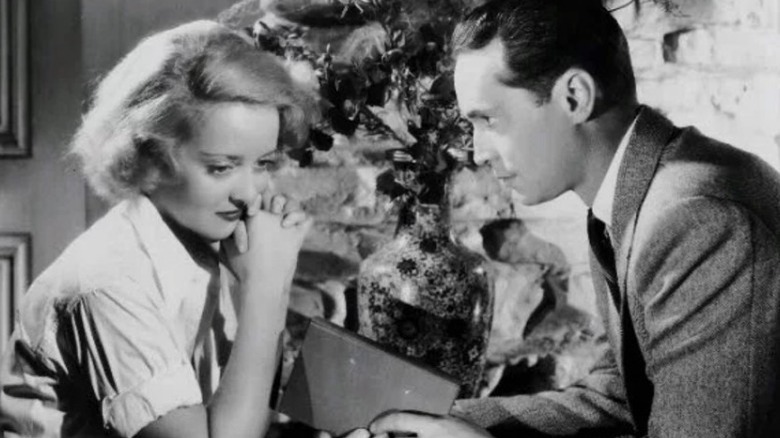
Bette Davis was working consistently in Hollywood in the early 1930s but was struggling to break through in a meaningful way. That changed dramatically in 1934, with a write-in Oscar nomination for best actress. She didn't win, but it was a big moment in Hollywood that established that Davis was far more beloved and respected than studio executives believed.
The following year, Davis got her first official nomination for "Dangerous," directed by Alfred E. Green. Not only did Davis secure the nom, but she also walked away with her first Oscar for best actress. Davis stars as Joyce Heath, an actress who was once the hottest name in the New York theatre scene before a series of circumstances deemed her a jinx. All but forgotten, Joyce spends her days and nights drinking until Don Bellows (Franchot Tone) stumbles upon her and is determined to get her name back in lights.
Admittedly, the film verges on forgettable, and Davis swallows up her male co-stars. They couldn't match her charisma if their lives depended on it. However, Davis' performance is wonderful and seems so far removed from the kinds of characters she became legendary for. It's a sensitive, wounded performance, backed by a fiery passion and simmering severity that more than deserved Oscar gold.
The Anniversary
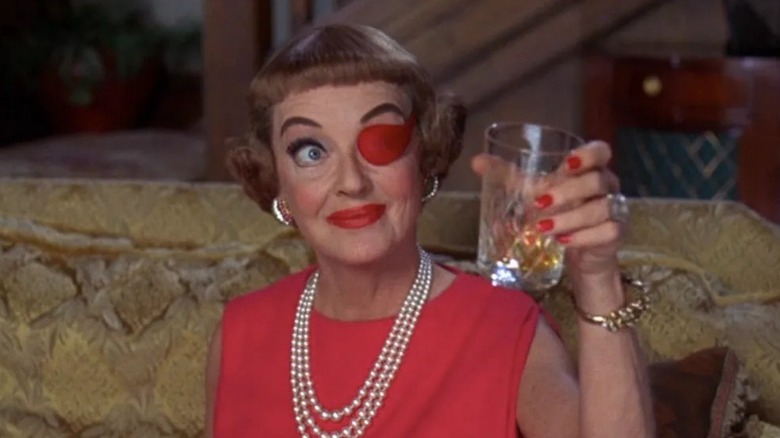
With films like "All About Eve," "The Little Foxes," and "Mr. Skeffington," Bette Davis established a real knack for extremely opinionated and utterly ruthless women. While Davis had the range to do just about anything, these nastier, shadier characters made her legendary.
If one film in Bette Davis' later career took these characteristics and amplified them to the extreme, it was Roy Ward Baker's 1968 black comedy, "The Anniversary." Davis plays the relentlessly wicked Mrs. Taggart, who summons her three adult sons back to her house every year to celebrate the anniversary of her wedding anniversary — even though her husband passed many years ago. This time, each son has something to tell their mother that threatens to doom their relationship. Things are bound to get uncomfortable.
Essentially people yelling at each other for 95 minutes straight, "The Anniversary" is a vicious and ridiculous farce. Davis is tremendous, owning every minute and spitting venomous lines with abject glee. Her hair and outfits are amazing, but Davis also sports a fashionable teardrop-shaped eyepatch — color-coordinated with her fashions, naturally. It loses points on one of the son's plotlines that aged poorly (to put it lightly), but "The Anniversary" is a deeply uncomfortable and funny riot about family pressure with some truly awful people. Davis was never more callous, and it's an absolute thrill to watch.
Storm Center
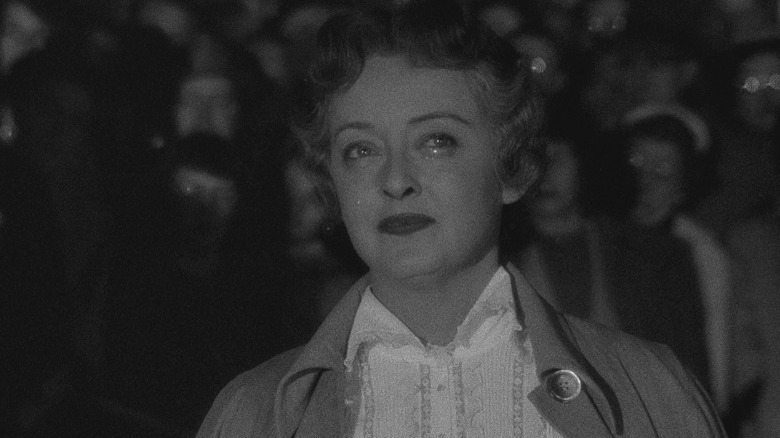
The 1956 drama "Storm Center" is one of Bette Davis' most surprising films. Directed by Daniel Taradash (who also co-wrote the script), "Storm Center" was inspired by the story of Ruth Winifred Brown, a librarian who lost her job under suspicions of communist activity. Davis stars as Alicia Hull, a librarian determined to spread a love of reading to the children in her small town. When the city council demands Hull remove a particular book from the library, "The Communist Dream," she refuses. This decision costs Alicia her position. In addition to unemployment, Hull is also tormented by the town as she's branded a communist herself.
It's no small feat that "Storm Center" was produced, as it tackled McCarthyism, and is generally considered the first American film to do so. Taradash's script is so interesting because it's not really about whether Hull is a communist. Instead, it's invested in how words hold power and how mere suggestion infects the town and paints the librarian as a pariah. Opening with thrilling titles from renowned designer Saul Bass and anchored by a brave, inspiring performance from Davis, "Storm Center" is an exciting drama with an important place in Hollywood history.
Of Human Bondage
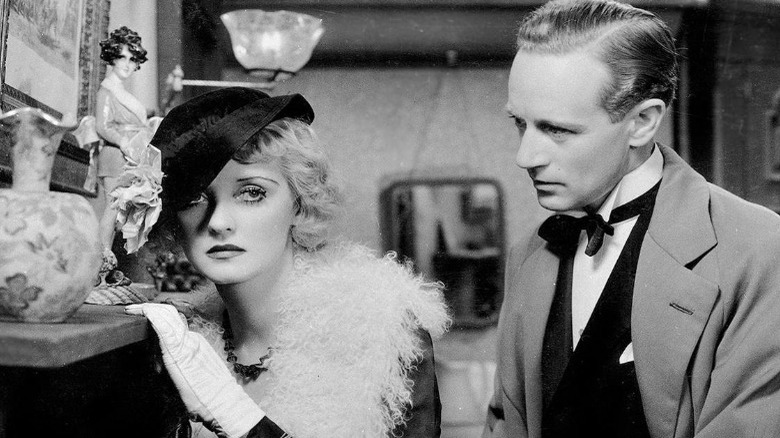
Bette Davis ascended to stardom with John Cromwell's "Of Human Bondage" in 1934. The actress had many roles before this one, but her staggering, ferocious performance as Mildred Rogers made Hollywood take notice. So much so that Davis became a write-in nominee at the Academy Awards for her performance. Watching "Of Human Bondage," it's clear why this is the role that set her on the path her fans know her for. The scene in which Davis lashes out at Leslie Howard is full of passion, rage, and undeniable star quality.
The film follows Philip (Howard), an artist who turns to the medical field after he's told he doesn't have the talent to make it in the art world. Upon meeting Mildred (Davis), he's completely smitten. That feeling is in no way reciprocated. Mildred is stunningly callous to Philip, dismissing him with glee and mocking him for his disability. Still, the two begin a toxic on-again-off-again relationship destined to doom them. No matter what Philip does, and no matter how far he gets from Mildred, he finds it impossible to resist her. Shot like a silent film and full of powerful close-ups, "Of Human Bondage" thrums with emotion.
The Letter
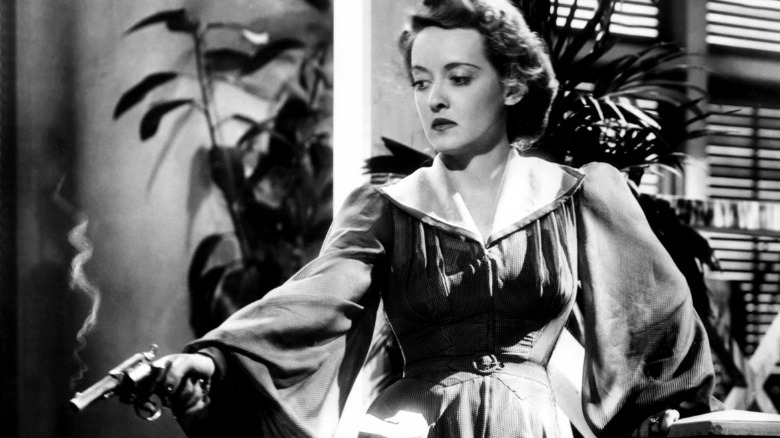
A gunshot breaks the peaceful quiet in William Wyler's "The Letter," and with it comes one of Bette Davis' most iconic screen entrances. Wielding a gun and blasting away, she shoots a man dead. She is Leslie Crosbie, the wife of Robert (Herbert Marshall), who runs a rubber plantation on the Malaysian peninsula. Leslie cooly explains that the man she killed was trying to get her to commit adultery, and his forceful ways meant she had no choice but to dispatch him to maintain her honor. Murder means a trial is guaranteed, but there's no doubt that Leslie will emerge unscathed. However, the appearance of a mysterious letter threatens to undo Leslie's future.
Wyler's film maintains tension throughout, and Davis' performance is unsurprisingly excellent. "The Letter" may be the weakest collaboration between Wyler and Davis, but the film has plenty of intrigue and excitement, even if it never quite lives up to the promise of the film's exhilarating opening. Sadly, the film's ending was dulled by restrictions from the Hays Code.
In This Our Life
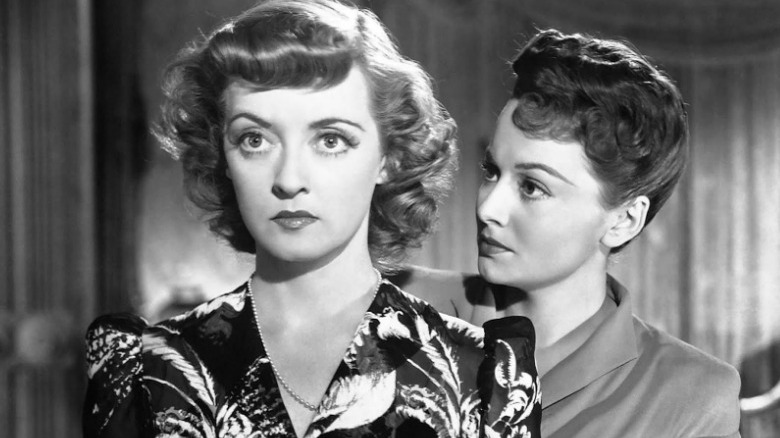
Bette Davis had a reputation for being difficult to work with — especially for those with whom she didn't agree. Nevertheless, Davis had some genuine friendships that cut through all the Hollywood glitz and glam. One of her closest friends was legendary actress Olivia de Havilland. Watch this wonderful clip of them on the show "This Is Your Life." Their genuine affection for one another is a joy to behold. Despite both being in many films, they only collaborated six times. One of their very best films together was John Huston's "In This Our Life."
This stunning melodrama finds Davis and de Havilland playing rival sisters. Roy (de Havilland) is happily married to Peter (Dennis Morgan), while Stanley (Davis) is engaged to Craig (George Brent). Stanley has always been hard to pin down, and although Roy loves her sister, she's always been cautious around her. Her unpredictability nags at her. It turns out Roy is right to be cautious. On a whim, Stanley runs away with Roy's husband.
Bouncing between sly and seductive to vicious and manipulative, Davis is fascinating. Although Stanley is ruthless, Davis is so convincing that there's never any doubt that these men would fall head over heels for her.
The Star
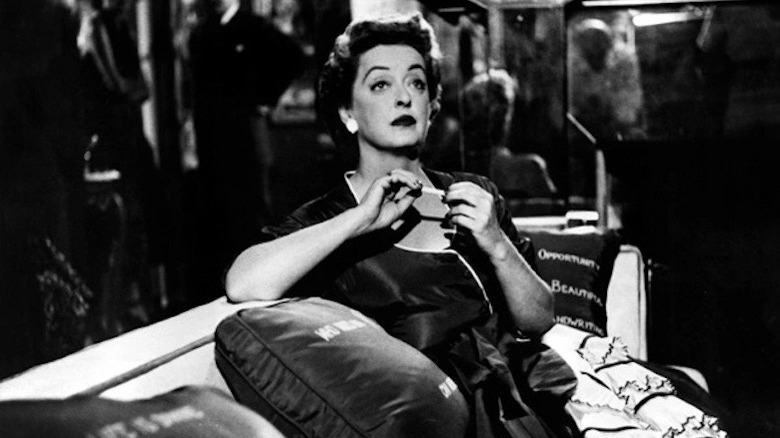
In the showbiz melodrama "The Star," Bette Davis plays Margaret Elliot, a movie star on top of the world. Or rather, she was on top of the world. Margaret has all but faded from the limelight and barely has a penny to her name. It's not for a lack of talent. Margaret has been cast aside because of her age.
Her friend, Jim (Sterling Hayden), tries to get her to reassess her future. Hollywood is done with her, but that doesn't mean her life can't still be rich and fruitful. He tries taking her away on vacation to see the joy in life, but Margaret can't help but yearn for the stardom she once had. When the opportunity arises for Margaret to finally get back on screen, she has to fight with her ego. Her greatest challenge may be to descend (as she sees it) from Oscar-winning superstar to bit player.
This is one of Davis' most heartbreaking roles, a woman who's only past her prime because society deems her that way. She's absolutely fantastic, channeling that queasy feeling of what happens when your career becomes your entire life and how it feels to have that career no longer want you.
Mr. Skeffington
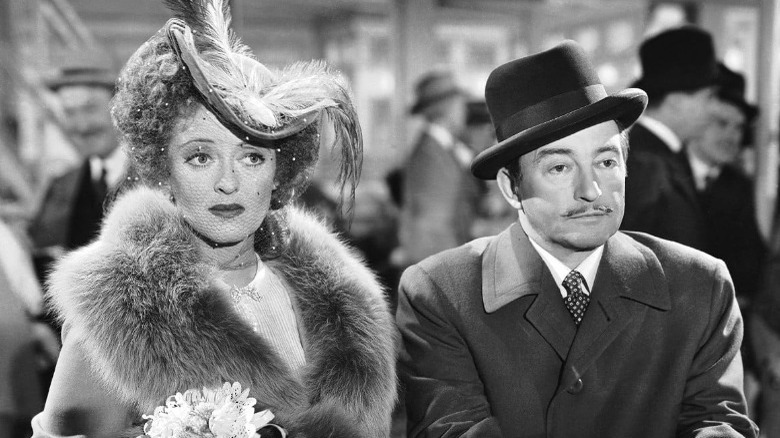
Delivering her cruelty with a conniving, twisted smile, Bette Davis was rarely nastier than she was in "Mr. Skeffington." She plays Fanny Trellis, a woman who, according to her husband, the titular Mr. Job Skeffington (Claude Rains), could never really love anyone. That's probably true, but the closest thing Fanny has to love is her brother, Trippy (Richard Waring). When she discovers that her brother has embezzled money from his employer, Job, Fanny marries him to help her brother avoid prosecution.
This infuriates Trippy, as he's antisemitic, and Job is Jewish. It's a loveless marriage for Fanny and Job, though. Lovestruck, Job continues their marriage even though he knows his love will never be requited. "I married the woman everybody else wanted to," Job tells Fanny, knowing that she's never going to love him back. But at least he "got her," even if it's at the cost of his (and everyone else's) happiness. The movie spans a considerable number of years, and Fanny eventually falls extremely ill with diphtheria, which strips away the beauty she's so intensely coveted. It leads to a tremendous scene where Fanny sits in bed eating. As the ravages of the illness seem to have suddenly caught up with her in a devastating fashion, she's haunted by hallucinations. One of the earliest films to thoughtfully explore antisemitism, "Mr. Skeffington" is a searing drama featuring one of Davis' most difficult and exciting characters.
Hush... Hush, Sweet Charlotte
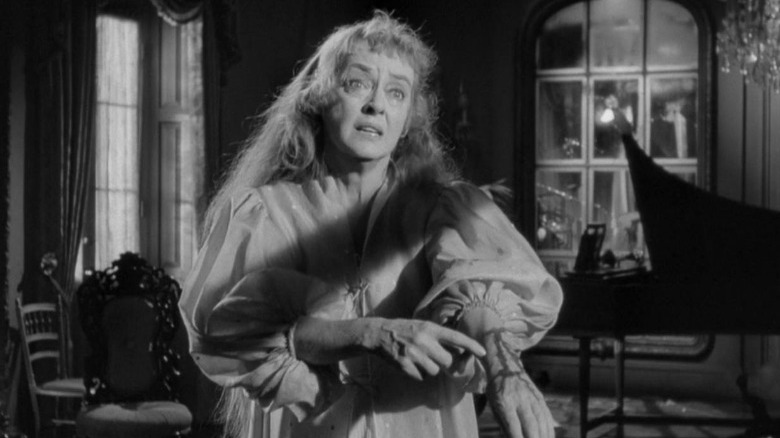
In the early days of Bette Davis' career, one could have never imagined her in a horror film. Nevertheless, Davis' later career was full of interesting genre roles. "Hush... Hush, Sweet Charlotte" was a spiritual successor to 1962's "Whatever Happened to Baby Jane?" Directed by Robert Aldrich, "Hush... Hush, Sweet Charlotte" finds Davis playing the eponymous Charlotte, a woman haunted by the death of her husband 40 years earlier. Charlotte is a total recluse in danger of losing the home she loves so much. Her mysterious cousin Miriam (Olivia de Havilland) comes to help Charlotte keep her house. Things get complicated (and terrifying) when Charlotte is terrorized by the severed head of her dead husband, whom Charlotte found decapitated at a party decades prior.
An engrossing horror, Aldrich's gothic mystery is a chilling and exhilarating film. "Hush... Hush, Sweet Charlotte" also stars Joseph Cotton and Mary Astor, as well as a particularly terrific and unhinged supporting turn from Agnes Moorehead, who was nominated for an Oscar alongside six other nominations for the film. Playing a character no longer concerned with beauty allows Davis to go further and darker than her typically impressive fare.
Jezebel
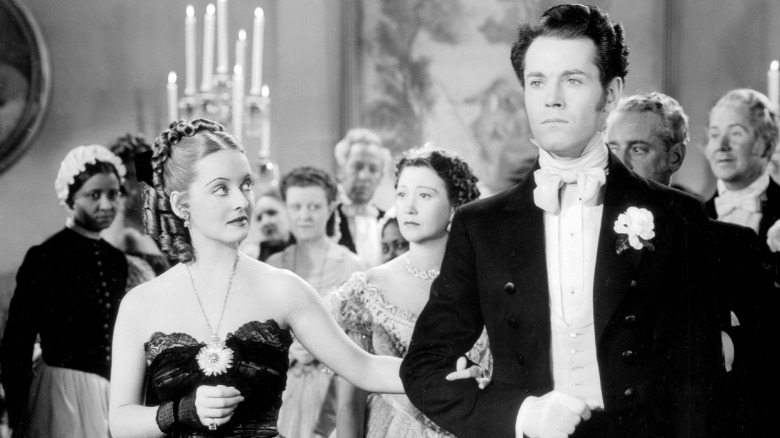
Bette Davis always fought for what she felt was right. A prime example of this was her highly publicized contract dispute with Warner Bros. After her Oscar win, Davis wanted her contract to be more reflective of her amazing talent, and most importantly, she wanted roles that suited her. That doesn't seem to be much of an ask, but in the 1930s, it was really quite something. Her negotiations were unsuccessful, and she famously remarked, "I am a woman. I was told I had no right to fight like a man. Jack Warner was determined to teach me a lesson."
That rebellious energy is the key to her expressive performance in "Jezebel." In her second collaboration with William Wyler, Davis stars as Julie, a Southern belle who seems to derive joy from upsetting societal norms. All Julie must do for the annual Olympus ball is wear a white dress like all the other unmarried women. But where's the fun in that? Instead, Julie dons a bold red gown, astonishing everyone.
Despite his objections, her fiancé, Preston (Henry Fonda), does his best to play along, but Julie's rebellion proves too much for even him. The next day, he leaves her and breaks off their engagement. For most people, that would be the end. For Julie, it's a challenge. She's going to get her man back. It's no surprise that Davis won her second Oscar for this fiery, vain, and glorious performance.
The Little Foxes
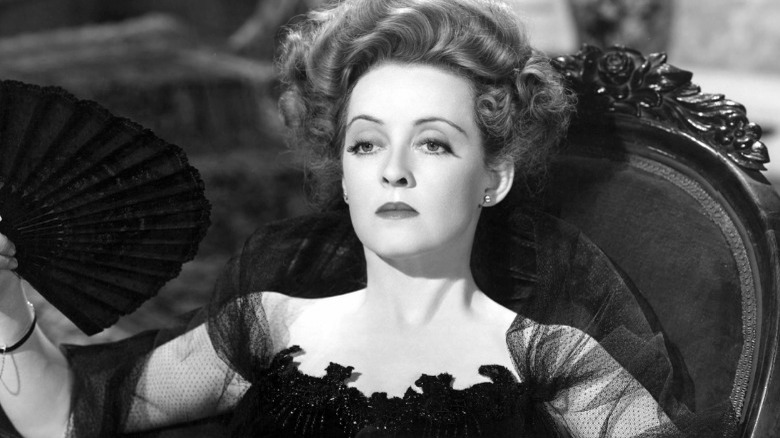
"If Willy Wyler told me to jump in the Hudson River, I would. I would have done anything he asked me," Bette Davis said of director William Wyler. The pair collaborated three times. The first, "Jezebel," earned Davis her second Oscar. But all three films earned Davis nominations, and for our money, her finest collaboration with Wyler is the intoxicating "The Little Foxes."
The film finds Wyler and Davis working together again in the American South. This time, Davis plays Regina Giddens. Regina is a major societal player, but thanks to the law, only sons are considered legitimate heirs. Because of this, Regina is left to depend on her husband while her greedy brothers have all the money they could ever want.
As you can imagine, Davis channels a lifetime of frustration and anger into Regina. Her performance is a tour de force. The film is based on a play by Lilian Hellman and is packed with theatricality. It's rarely been more exciting to watch Davis cut people down with her viper's tongue. Regina practically relishes the eventual demise of her husband. In one of the film's most memorable scenes, she sits back, framed in a chilling close-up as he suffers a heart attack after she verbally lacerates him. It's brutal, yet oh so thrilling. If you're having doubts about your own relationships, watching "The Little Foxes" will make you feel much better about your situation.
Dark Victory
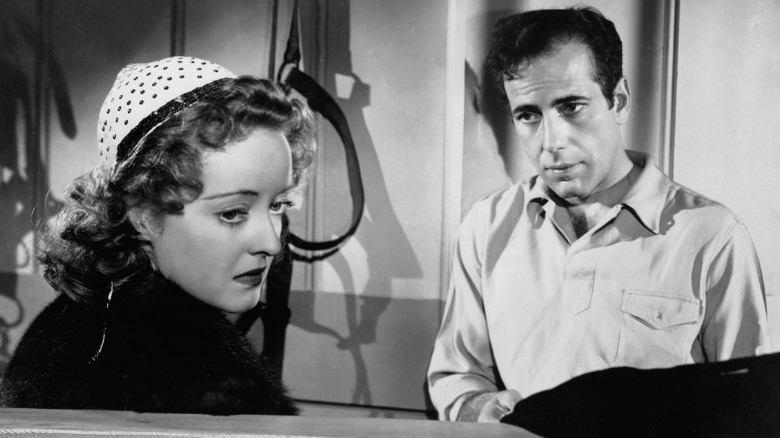
One of Davis' most beloved screen partners was George Brent. The two were entwined in cinema for much of the 1930s, starring together in nearly a dozen films. In her memoir "This 'N That," Davis even remarks that Brent was one of the great loves of her life, though the two were never married. Their chemistry was always apparent, but it was never more scintillating and emotional than in Edmund Golding's heartbreaking and powerful "Dark Victory."
Davis is sensational as Judith Traherne, a socialite with a penchant for partying. Behind Judith's eyes is a devastating reality. She has an inoperable brain tumor and must come to terms with the end of her life. Judith falls madly in love with her doctor (Brent), and the pair marry with the intent of enjoying the rest of Judith's life together. Yet, it's not that simple, as Judith's longtime friend and stable master, O'Leary (Humphrey Bogart), confesses his love for Judith. It's one of Davis' most complex and emotional roles, beautifully expressing Judith's unimaginable circumstances in ways that resonate deeply. The ending of "Dark Victory" hits hard as Davis channels a lifetime of Judith's emotions into a single, heartrending look.
Sure, it's emotionally manipulative, but "Dark Victory" is so effective it's best to let yourself get swept up in the magic of it all.
Now, Voyager
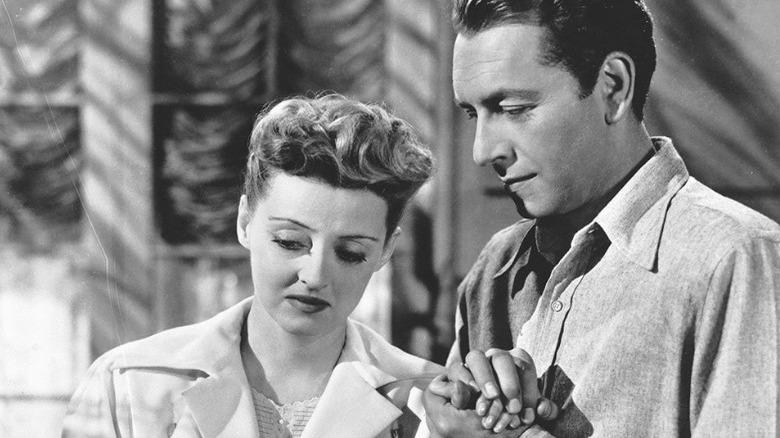
Charlotte Vale (Bette Davis) has a challenging life. She's incredibly neurotic and lives under the thumb of her brutal mother (Gladys Cooper). Charlotte has longed for a life of her own, but thanks to her mother, she's never been anything but unhappy and desperately alone. She sees herself as utterly unlovable and unworthy until she meets Dr. Jaquith (Claude Rains) during a stint in a sanatorium. The psychiatrist helps inspire newfound confidence in Charlotte.
It's a life-changing relationship that sends Charlotte on a cruise to South America. She undergoes a physical transformation that mirrors her new self-loving life. There, she meets Jerry (Paul Henreid), and the couple falls for each other on the seas, though Jerry has a wife and family waiting for him at home. Can Charlotte ever be happy with Jerry, or is he just a stepping stone to better things? "Now, Voyager," directed with impressive precision by Irving Rapper, is a swooning and unconventional melodrama to end all melodramas. It's utterly engrossing and totally timeless. It also provides vital evidence that Davis could play much more than conniving characters, showing off every aspect of her wondrous talents.
It all coalesces in one of the most romantic, illuminating moments of Davis' career, ending the film with the unforgettable line, "Don't let's ask for the moon. We have the stars."
Whatever Happened To Baby Jane?
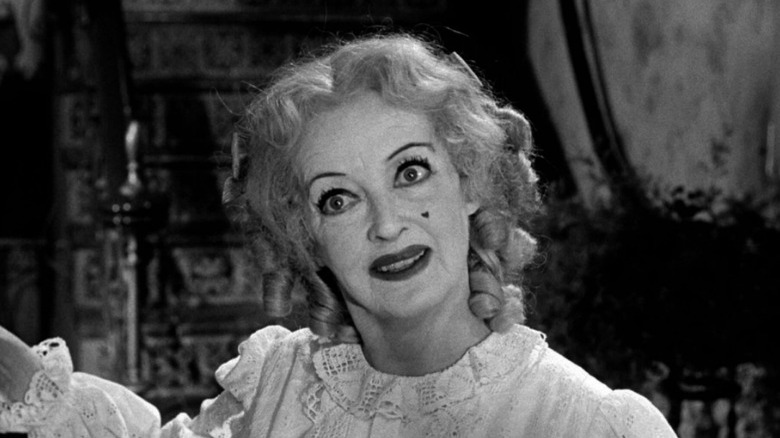
It's hard to imagine that someone as gifted as Bette Davis could have a faltering career, but it was a very different time for women in Hollywood. While things haven't gotten much better, there was a trenchant desire to keep women on screen young — regardless of the age of their male counterparts. Robert Aldrich's "Whatever Happened to Baby Jane?" seems like a direct comment on this issue that plagued the industry (and, in many ways, still does).
"Whatever Happened to Baby Jane?" is the stuff of legends. Joan Crawford stars alongside Davis. Their legendary rivalry informed the series "Feud," created by Ryan Murphy. The pair plays sisters, former child stars who have completely faded. They live in a decrepit mansion, and Jane (a haunting Davis) is more domineering than ever, especially since her sister Blanche (Crawford) was paralyzed from the waist down in an accident believed to have been caused by Jane, though there's no evidence. You can feel their rivalry come to life on screen. After all, Davis is notorious for saying, "The best time I ever had with Joan Crawford was when I pushed her down the stairs."
Bette Davis delivers an extraordinary performance. It almost seems as if Davis is staring directly into the souls of studio executives, reminding them that just because she was too old to be considered an "ingenue," that does not mean that she still wasn't one of the best actresses ever. Davis has never been more frightening, and throughout her magnificent oeuvre, there was only one time she burned brighter.
All About Eve
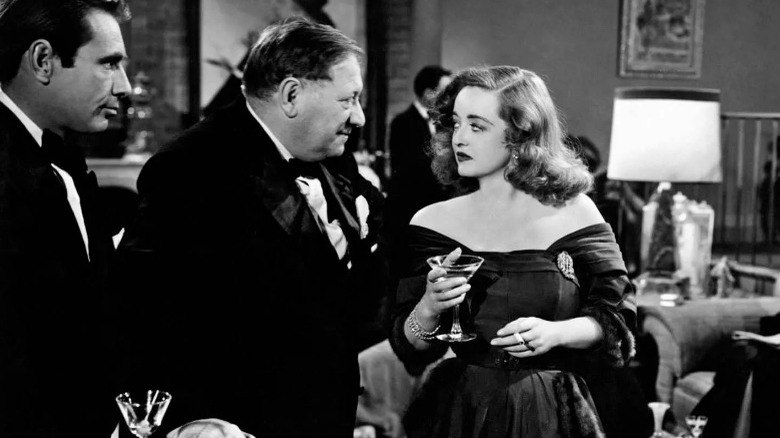
There's a reason that Joseph L. Mankiewicz's "All About Eve" is considered Bette Davis' defining performance. Margo Channing is one of the theatre's most prominent actresses, who, after a show, is visited by Eve Harrington (Anne Baxter), a devoted fan who wants to one day be in Margo's shoes. It seems innocent enough, though Margo's maid, Birdie (the eternally scene-stealing Thelma Ritter), is suspicious from the jump. Soon enough, Eve does exactly what she set out to do, taking Margo's place at the top of the theatre's firmament.
As Margo, Davis commands every second of screentime. She's impossible to look away from, and Davis has never seemed more at home on screen than she does here. There's a spine-tingling thrill every time she speaks. Margo is a woman who will say whatever comes to mind without fear of repercussion, and that makes her electrifying to watch. "All About Eve" is full of squabbles, from the petty to the downright epic, and its all-star cast (including Marilyn Monroe) makes the most of every moment. It may just be a perfect film. Not a moment of its two-and-a-half-hour runtime is wasted, and everyone is in top form. Exposing the seedy underbelly of the entertainment industry, it's a scathing film but also an incredibly human one.
Davis promises us a bumpy night, but what "All About Eve" delivers is the ride of a lifetime. As a bonus, "All About Eve" has one of the best endings in film history, with a kaleidoscopic final shot that ties up the film's themes in a venomous bow.
Read this next: Alfred Hitchcock's 20 Best Films Ranked
The post The 15 Best Bette Davis Movies, Ranked appeared first on /Film.
0 Commentaires